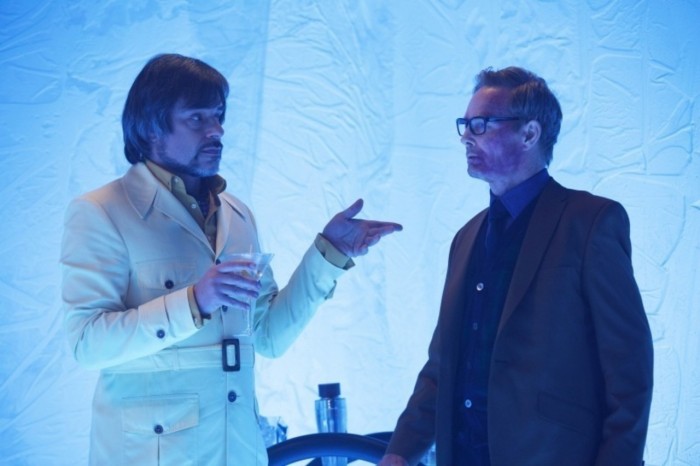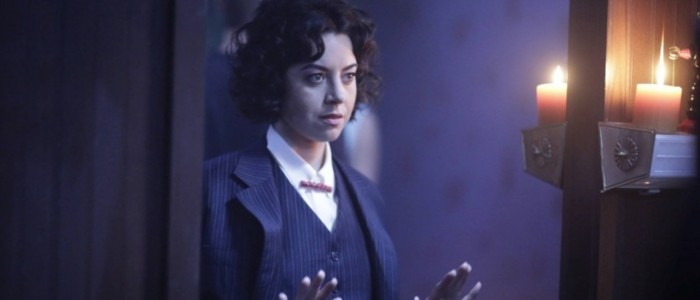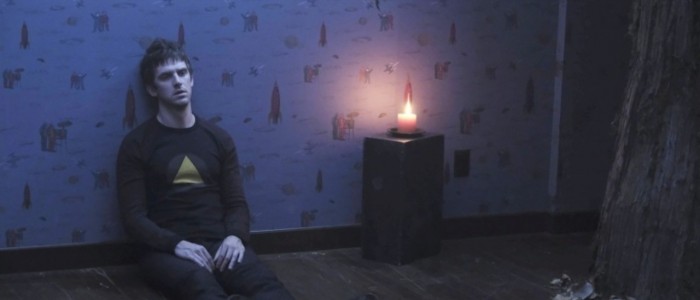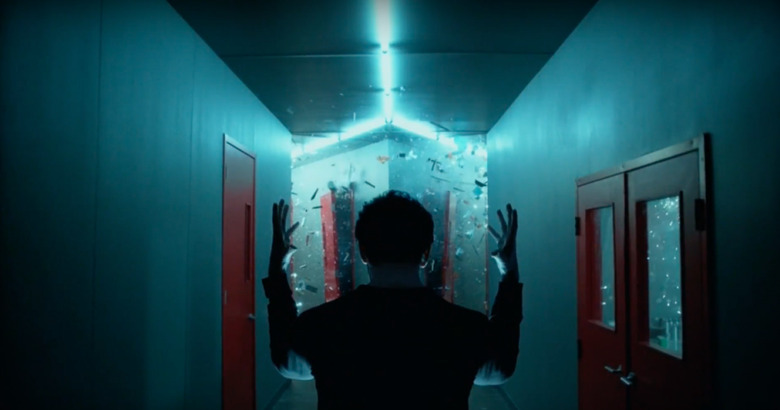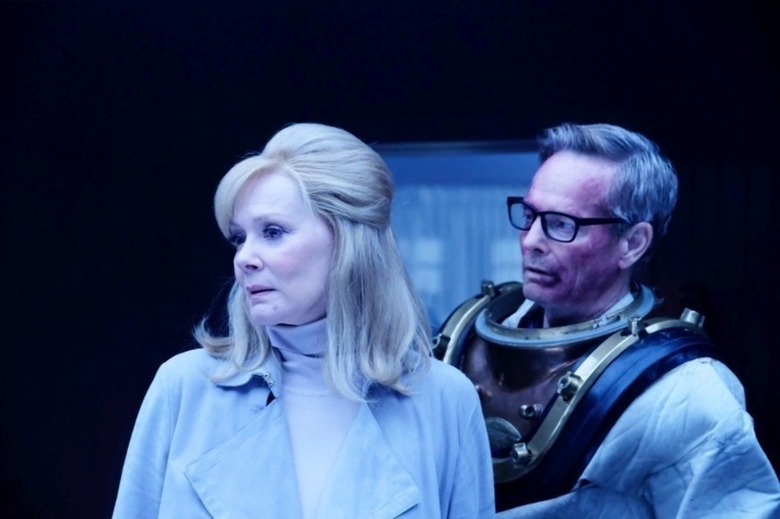'Legion' Spoiler Review: Thoughts On ''Chapter 7''
After last week's disappointing episode, Legion is back on track in a big way. "Chapter 7" finds FX's X-Men series topping itself once again – this is one of the most clever, frightening, bizarre, and funny hours of television we can hope to see all year.
One Homage After Another
Legion has always played with filmmaking techniques in various inventive ways, but "Chapter 7" saw the show get even more specific with what it chose to appropriate. Instead of utilizing elements of cinematic language, the series broke out a few direct homages, leaning on imagery that will be recognizable to many viewers.
For starters, there's the way those monstrous eyes appear on screen, observing the actions of our heroes as they fight for their lives. That image, along with the surreal and increasingly color-coded hallways of the psychically recreated halls of Clockworks, directly recall Dario Argento's Suspiria, one of the greatest horror movies of all time. If you want to create a sense of being watched, of being trapped in a nightmare that does not make sense because the typical rules of reality no longer apply, there are far worse films from which to lift. In fact, it makes sense that a horror-driven show that always has one foot in the dreamworld would draw from a film that feels like a bad dream.
In a more obvious homage, Oliver Bird cooks up an invention to assist our heroes in their escape: pairs of glasses that block the psychic manifestations cooked by David's monster and allow the wearer to see reality (or at least, a less manipulated version of David's mind). This very concept, along with how the glasses transform the world into black and white, is a clever lift from John Carpenter's They Live, where special sunglasses reveal the darkest truths about the world.
And since those glasses make the world black and white and strip away all sound, Legion goes a step further and becomes a full-blown silent movie once its cast is decked out in Oliver's gear. Dialogue is revealed in title cards and the arrival of Lenny, looking like she stepped straight of The Cabinet of Dr. Caligari, is accompanied with "The monster arrives!" In a show that so often blends the quirky and the grim, it's a bizarre and hilarious touch. Legion wears a straight face most of the time, but it's never above actually having fun. It helps that Plaza, so very good in this part, moves like an animal in human skin, appearing less and less like a person with every moment. This is one of the great television performances of 2017.
This all makes sense – of course our mind will be full of pop culture references. We soak that stuff in every single day and it informs how we live our lives and see the world. In Legion's hands, movie homages manifest themselves as literally as possible. That's always been this show's modus operandi – to take the abstract and make it tangible.
The Amazing Oliver Bird
After sitting the past few episodes out, Jemaine Clement's Oliver Bird came back and it's really nice to have him around. He was a scene-stealer earlier in the season and now that he's actively involved in the battle against the parasite plaguing David's mind, he's only grown more fun. It's still not clear if he's actually a mutant, but he does reveal a talent for manipulating the astral plane, crafting useful gadgets like those glasses and "Jules Verne," his diving suit that seemingly protects the wearer from the influences of the monster. Of course, his best moment involves him "conducting" reality, building a psychic shield out of words that literally manifest out of thin air. That may be a little on-the-nose for a guy who fancies himself a beat poet and a music lover, but it's a wonderful image. In the malleable world of the astral plane, Oliver's passions become an actual superpower.
Most importantly, Oliver has finally left the astral plane and once again living in the real world. Whether this means he's joining the actual cast or will just hang around for the season finale is unknown, but Legion is just a little bit better whenever he's around.
The Villain Reveals Itself
After weeks of referring to the thing lurking in David's mind as Lenny, King the Beagle, the World's Angriest Boy in the World, and the devil with yellow eyes, we finally have a name for this monstrosity. Courtesy of Oliver Bird, who seemingly has firsthand experience of this particular villain, we can know call it Farouk, who also goes by the unsettling moniker of "the Shadow King."
The Shadow King, AKA Amahl Farouk, is an X-Men comic book villain, a being composed of psychic energy that can take on many forms and feeds on human minds. The character has a history with David and David's father (more on him in a moment) in the comics, having clashed with mutantkind several times since its debut in 1979. The specific details remain obscured, but the writing's (literally) on the wall: Farouk clashed with David's father, a powerful mutant, years ago, and was defeated and its physical body destroyed. However, Farouk lived on as a psychic parasite, seeking out David for both vengeance and the desire to use his powers to achieve god-like status.
It's refreshing to finally have a name and motivation for the monster, especially since its backstory ties perfectly into Legion's themes. If David's powers are a metaphor for mental illness, what better way to illustrate that than to have his most troubling problem be something passed down by his father? He didn't want this and he didn't need this, but we all carry our parents' baggage.. David doesn't know his real father, but a piece of him has lodged itself in his mind...a piece that is doing nobody any good and can't be helped.
David and David Solve a Problem
In the best sequence of "Chapter 7," David thinks really hard and solves a problem. But since a character sitting in the dark and thinking about his secret history is not particularly cinematic, Legion takes advantage of the fact that this is all taking place in a fantasy world conjured up by a psychic entity and allows David to literally talk to himself.
While sitting in an invisible coffin stored in the darkest, deepest recesses of his own mind, David meets his own rational mind. Legion really does offer up the best sentences, doesn't it? Anyway, David's Rational Mind is also played by Dan Stevens, using his real English accent because, well, he's his rational mind (a very silly joke that arrives at just the right time). Because time and space have no limits, both David and his Rational Mind hash things out in a classroom, where David's notes on a series of chalkboards transform into an elaborately animated exposition dump that doesn't actually feel like an exposition dump because it's visually stunning and relayed by Dan Stevens having a conversation with Dan Stevens in front of a series of chalkboards that turn into screens showing hand-drawn depictions of past events that are somehow both adorable and creepy. Whoa.
Simply put, Legion is one of the most visually inventive shows to ever air on television, using a world with limitless possibilities to present information in ways that feel wholly fresh. Watching David Haller talk to himself (because that is literally what we're seeing) is more thrilling than most comic book movie action scenes. This is a superhero story like we've never seen before, one that uses superpowers to journey within rather than deliver blockbuster spectacle. The incredible visuals and clever storytelling of "Chapter 7" doesn't absolve "Chapter 6" of being a dull speed bump in the middle of a great season, but it's clear that the show was probably saving its money to deliver one of the best hours of television we'll probably watch in 2017.
Who is Your Daddy and What Does He Do?
In these weekly reviews, I've hemmed and hawed over whether or not we should be talking about David Haller's father. The show's cast and creators have been open about his identity and it's established Marvel comics lore that's just a quick Google search away. However, "Chapter 7" tipped its hand in such a big, obvious fashion that we have to talk about it. If you want to wait for the show to actually reveal it, just skip to the next section. Don't read any further.
Yep, David Haller is the son of Professor Charles Xavier, the power psychic who founded the X-Men and is played by Patrick Stewart in the movies. Those chalkboard animations make it pretty clear, as David's father is depicted as mutant wearing a suit with a bald head who touches his face in a pretty distinctive way when he activates his mental powers. And then there's the quick shot of a very familiar wheelchair, whose spokes form the shape of an "X." If that wasn't enough, David's improvised impression of the father he never knew is totally a Patrick Stewart impersonation.
The comic book version of David Haller has daddy issues, to put it mildly, so it'll be interesting to see how Legion proceeds with this particular thread. Could they get Stewart to put in a cameo appearance? Will this inevitable reveal tighten Legion's connections to the larger X-Men world? As much as I'd like to see this show slide right into a larger continuity (that's the default nerd way), I genuinely love how this series has managed to get by as its own weird little thing. Hopefully, it can continue to find that fine line between being an X-Men show and a show beholden to nothing else.
A Surge of Self Confidence
In the grand finale of "Chapter 7," David, newly armed with knowledge about himself and his enemy, breaks out of his prison of total darkness, summons his newfound powers, and obliterates the fictitious Clockworks that has been holding his friends prisoner. He takes control of his mind and he buries his sickness down deep.
Allow me to get personal for a moment. I'll never forget walking into a psychiatrist's office after a lifetime of depression and anxiety, only for the doctor to literally take out a piece of paper and draw out every single thing that was happening in my brain and explain, in detail, what was going on in my mind. The clarity was amazing. It didn't erase my problems (those will last a lifetime), but the confidence that comes from knowing your enemy and knowing yourself is a vital weapon in self-care.
I thought about this appointment as I watched David understand his formerly unknowable enemy and take control of his existence. I also thought about this when it was revealed that the Shadow King was not gone – it was just pushed down into the darkness, plotting its next move, temporarily halted by Cary's goofy head collar. The X-Men stories have often operated as allegories, usually as metaphors for oppressed people fighting to earn their place in a world that doesn't understand them. Legion established early and often that it's a show about mental illness that just-so-happens to be dressed in spandex and tights. This victory, however temporary it turns out to be, feels vital.
One Down...
So, uh, Walter is dead. After menacing Kerry for the bulk of the episode and chasing our heroes for the bulk of the season, the mysterious villain known as "The Eye" was crumpled like a ball of aluminum foil by Farouk, removing him from the chessboard entirely. In one way, it makes sense – the guy who looked like the chief villain of the series has nothing on the monster that's been lurking close to David all along.
However, with one episode still left in the season, Legion revealed one final threat: Division 3 may have lost its leader a few episodes ago, but they've still managed to find Summerland and they've arrived in full force. More importantly, that interrogator from the very first episode is still alive, hideously burnt, and not ready to take prisoners. And, of course, Farouk is already beginning to break out of David's mental prison.
Legion's first season ends next week and all of the pieces are in place for everything to come crashing down. See you then.

